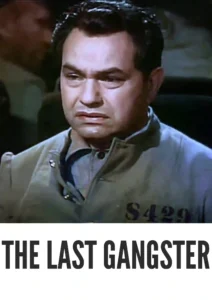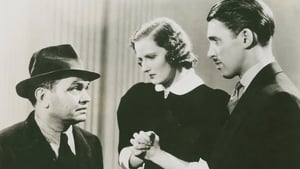Contact: [email protected]
Video Sources 0 Views
- Watch trailer
- The Last Gangster


Synopsis
Table of Contents
ToggleReview: In The Last Gangster (1937) – A Gripping Crime Drama Recolored for Modern Audiences

Introduction
“In The Last Gangster” (1937) emerges as a classic crime drama, capturing the essence of the gangster era with its gripping narrative and compelling characters. In this review, we delve into the significance of this early colored film and its transformation for modern audiences.
Check The Full Colorized Movies List
Check Our Colorized Movies Trailer Channel
Understanding In The Last Gangster 1937: Director, Cast, and Genre
Directed by Edward Ludwig, “In The Last Gangster” (1937) showcases his adeptness in crafting tension-filled narratives and dynamic character portrayals. The film features a stellar cast led by Edward G. Robinson, whose commanding presence and nuanced performance anchor the story. Blending elements of crime, drama, and suspense, “In The Last Gangster” immerses viewers in a world of illicit dealings and moral ambiguity.
Exploring the World of In The Last Gangster 1937: Plot and Characters
Set against the backdrop of Prohibition-era America, “In The Last Gangster” (1937) follows the rise and fall of a notorious gangster, portrayed by Edward G. Robinson, as he navigates the treacherous underworld of organized crime. Along the way, he encounters a cast of memorable characters, from loyal henchmen to cunning adversaries, each playing a pivotal role in his quest for power and redemption.
The Art of Film Colorization
Film colorization has the power to breathe new life into classic movies, offering modern audiences a fresh perspective on timeless stories. By adding color to black and white films, colorization transforms the viewing experience, enriching the visual palette and enhancing the emotional impact of the story.
Early Colored Films: A Brief History
The history of colored films traces back to the early days of cinema, with filmmakers experimenting with various techniques to add color to their creations. From hand-painted frames to early Technicolor processes, the evolution of colored film has been marked by innovation and experimentation, laying the groundwork for modern colorization techniques.
In The Last Gangster 1937 and Its Early Colored Version
The decision to release “In The Last Gangster” (1937) in a colorized format offers audiences a new way to experience this classic crime drama. While some purists may balk at the idea of tampering with the original black and white film, colorization breathes new life into the story, adding depth and vibrancy to the characters and settings.
The Debate Over Film Colorization
The debate over film colorization remains a contentious issue in the world of cinema, with proponents arguing that it revitalizes classic movies for modern audiences, while detractors claim that it compromises the artistic integrity of the original work. As technology advances, filmmakers and audiences alike must grapple with the ethical and aesthetic implications of colorization.
Examining In The Last Gangster 1937 as an Early Colored Film
As with any colorized classic, the impact of colorization on “In The Last Gangster” (1937) is open to interpretation. Some may argue that it enhances the film’s visual appeal and immerses viewers in its world, while others may feel that it detracts from the stark beauty of the original black and white version. Ultimately, the decision to watch the film in color or black and white is a matter of personal preference.
Influence and Legacy: In The Last Gangster 1937’s Impact on Cinema
“In The Last Gangster” (1937) has left an indelible mark on the world of cinema, inspiring countless filmmakers and captivating audiences with its gripping narrative and memorable characters. From its iconic performances to its taut direction, the film continues to resonate with viewers of all ages, cementing its status as a true classic of the crime drama genre.
Director’s Cinematic Legacy: Beyond In The Last Gangster 1937
Edward Ludwig’s influence extends far beyond “In The Last Gangster” (1937), with a diverse body of work that spans multiple genres and styles. From crime dramas to adventure epics, Ludwig’s films are celebrated for their craftsmanship and storytelling prowess, solidifying his legacy as one of the preeminent directors of Hollywood’s Golden Age.
Themes Explored in In The Last Gangster 1937
“In The Last Gangster” (1937) explores a range of themes, from power and corruption to loyalty and betrayal. Through its richly drawn characters and morally complex narrative, the film invites viewers to ponder the nature of good and evil in a world where the line between right and wrong is often blurred.
Reception and Controversy Surrounding In The Last Gangster 1937
Upon its release, “In The Last Gangster” (1937) received widespread critical acclaim, with many praising its taut direction, atmospheric cinematography, and powerhouse performances. However, the decision to release the film in a colorized format sparked debate among purists, reigniting the age-old discussion surrounding film preservation and artistic integrity.
Where to Watch In The Last Gangster 1937 Online
For those eager to experience the timeless magic of “In The Last Gangster” (1937), the film is readily available on popular streaming platforms such as Netflix, Amazon Prime, and Hulu. Whether you choose to watch it in its original black and white format or the early colored version, “In The Last Gangster” (1937) promises to captivate and enthrall audiences with its gripping tale of crime and redemption.
FAQs About In The Last Gangster 1937
Q: Is “In The Last Gangster” (1937) based on a true story? A: No, “In The Last Gangster” (1937) is a fictional tale crafted by screenwriters, drawing inspiration from the era of Prohibition-era crime and gangster culture.
Q: Who are the main actors in “In The Last Gangster” (1937)? A: “In The Last Gangster” (1937) stars the legendary Edward G. Robinson in the lead role, supported by a talented ensemble cast that includes James Stewart and Rose Stradner.
Q: What awards did “In The Last Gangster” (1937) win? A: While “In The Last Gangster” (1937) did not win any major awards, it received critical acclaim for its gripping narrative and powerhouse performances.
Q: Why was “In The Last Gangster” (1937) released in a colorized format? A: The decision to release “In The Last Gangster” (1937) in color was made to introduce the film to a new generation of viewers and enhance its visual appeal for modern audiences. While the choice to colorize the film sparked debate among purists, it ultimately allowed “In The Last Gangster” (1937) to reach a wider audience and ensure its continued relevance in the annals of cinematic history.
Conclusion
“In The Last Gangster” (1937) stands as a testament to the enduring appeal of classic crime dramas, captivating audiences with its gripping narrative, memorable characters, and timeless themes. Whether viewed in its original black and white format or the early colored version, the film continues to resonate with viewers of all ages, reaffirming its status as a true classic of the genre. As we reflect on the legacy of “In The Last Gangster” (1937), let us celebrate its enduring impact on cinema and its ability to transport us to a world of danger, deceit, and redemption.











